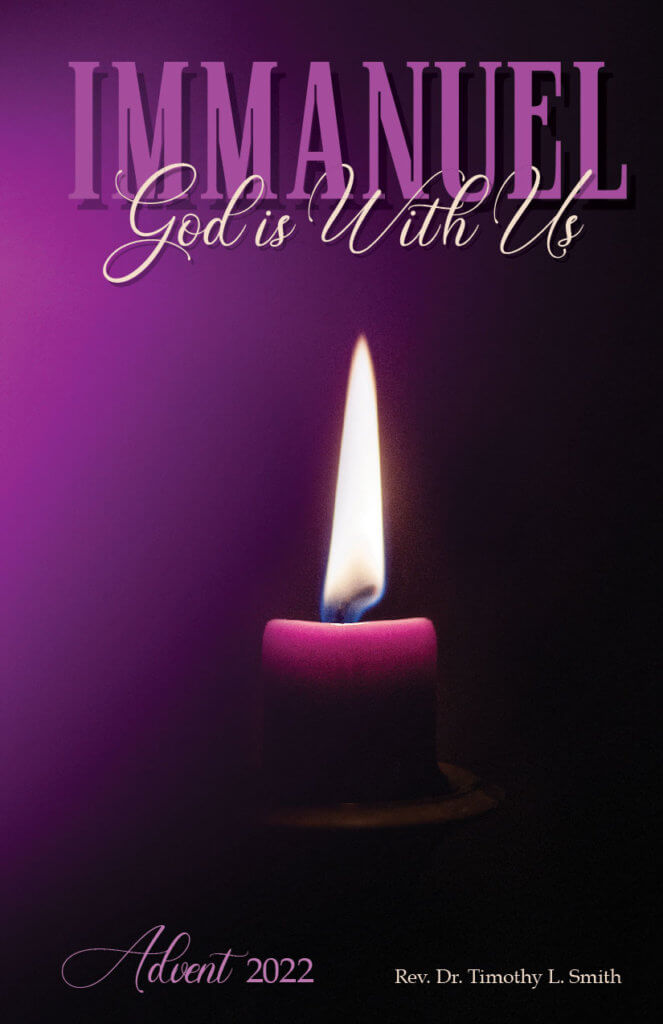With a rush of water and blood and the cry of a newborn, the eternal God enters time and space. The Creator deigns to become a creature. This tiny baby, laid into Bethlehem’s manger, bears the Hebrew name Immanuel, “God is with us.” He is born fulfilling Isaiah’s ancient prophecy that God Himself would come to be with us (Matthew 1:21-23; Isaiah 7:14; 8:8). His birth is the consummation of all the Old Testament’s sacrifices, feasts, prophecies and types, promising “God is coming!”
He who must stoop even to look on the heavens (Psalm 113:6), sleeps with cattle and oxen. He who formed the Virgin who bore Him, makes Himself dependent on her for His very life. The eternal Word makes Himself speechless; the Almighty God becomes powerless. “Infinity becoming finite, and immensity reduced to a span, He whom heaven cannot circumscribe, to be conceived and born a little tender infant.” (Christmas, Advent, or Entertainments for That Holy Season, anonymous 18th Century writers) The boundless God does not scorn becoming a creature so that He might bear for us and do for us what must be borne and done for our salvation.
Theologian Karl Barth explained the meaning of Immanuel like this: “God wills to be ours, and He wills that we should be His. He wills to belong to us and He wills that we should belong to Him. He does not will to be without us, and He does not will that we should be without Him…He does not will to be Himself in any other way than He is in this relationship…The blessings of His Godhead are so great that they overflow as blessings to us, who are not God.” (Karl Barth, Church Dogmatics, II/1) The infinite, ineffable God descending to be forever with us “assures us that the eternal God, let it be repeated, loves us more than he loves himself.” (Thomas Torrance, A Passion for Christ: The Vision that Ignites Ministry)
We are moved in this devotional to express the glories of Immanuel and to make Him the focus of our daily wonder and worship! “Immanuel, God with us in our nature, in our lifework, in our punishment, in our grave, and now with us, or rather we with Him, in resurrection, ascension, triumph, and Second Advent splendor.” (Charles Spurgeon, Morning by Morning) These daily reflections attempt to explore that which cannot be comprehended: the mystery of the Son of God becoming the Son of Man with us to make us sons and daughters of God. I fall short in an attempt to express this as did Saint Augustine: “What do any say when they speak of You! Yet woe to those who keep silence!” (Saint Augustine, The Confessions)
This devotional rejoices with Christianity’s first theologian, Irenaeus (A. D. 130-202): “Our Lord Jesus Christ, the Word of God, of His boundless love, became what we are that He might make us what He Himself is.” (Irenaeus, Against Heresies) Beyond all Christmas gifts and celebrations of the Season, our hearts long for Immanuel. We were created from Him and through Him and for Him, and find satisfaction only in Him (Romans 11:36). He is not aloof from us in heaven, distant from our pain and darkness, but comes to take on our nature, live our lives, endure our pain and sorrow, even our death, so that He might give us His very life.
Some times in these readings you will see Immanuel, with an “I”, and other times Emmanuel with an “E”. The reason for the different spellings is the language behind English translations. The Old Testament is written in Hebrew (and some Aramaic), while the New Testament is written in Greek. Immanuel with an “I” is a transliteration of the original Hebrew name “Im-manu” (with us) and “El” (God), while Emmanuel with an “E” is a transliteration of the New Testament Greek “Emmanouel”. The Gospel of Matthew cites the prophecy of Immanuel from Isaiah, using a Greek translation rather than the original Hebrew. Whether spelled Immanuel or Emmanuel, what is important is the meaning of the name: “God is with us!”
ABOUT THIS DAILY DEVOTIONAL
Each day of this devotional begins with PREPARATION: lighting a candle (or that week’s Advent candle) to remind us of Immanuel’s presence in that moment and throughout all of life. As we light the candle we become still, readying ourselves to listen for God’s Spirit to speak and reveal Immanuel’s glory to us. We do this assured of Jesus’ promise that the Holy Spirit would glorify Him, taking from Him and revealing Him to us (John 16:14). We know something will happen in the dynamic of these moments.
Lighting the candle is followed by REFLECTION: a Scripture reading and comments on it. We read and reflect in these moments, asking God to speak to us. Then, CONVERSATION: after listening to God speak, we speak, talking to Him about the scripture on which we have read and thought about. This is a time to tell God your thoughts and the feelings stirring within you. God wants to hear you!
Finally, REST: don’t rush off, but take a few moments to simply rest in Immanuel’s presence. Experience the rest that Jesus promises us. You need not say or do anything but be present to God who is always present to you. Remember Saint Augustine’s words: “God is closer to us than we are to our own selves.” (Saint Augustine, Confessions) Rest in that!
These Advent readings are presented, confident in God’s promise that the Holy Spirit will be working in us: And all of us “seeing the glory of the Lord as though reflected in a mirror, are being transformed into the same image from one degree of glory to another; for this comes from the Lord, the Spirit” (2 Corinthians 3:18). Take time to behold Immanuel’s glory and you will never be the same!



